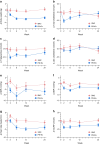A whole-food, plant-based intensive lifestyle intervention improves glycaemic control and reduces medications in individuals with type 2 diabetes: a randomised controlled trial
- PMID: 39305340
- PMCID: PMC11732952
- DOI: 10.1007/s00125-024-06272-8
A whole-food, plant-based intensive lifestyle intervention improves glycaemic control and reduces medications in individuals with type 2 diabetes: a randomised controlled trial
Erratum in
-
Correction: A whole-food, plant-based intensive lifestyle intervention improves glycaemic control and reduces medications in individuals with type 2 diabetes: a randomised controlled trial.Diabetologia. 2025 Feb;68(2):471. doi: 10.1007/s00125-024-06332-z. Diabetologia. 2025. PMID: 39585418 Free PMC article. No abstract available.
Abstract
Aims/hypothesis: We conducted the largest and longest clinical trial comparing a whole-food, plant-based intervention with standard medical care (SMC) in individuals with type 2 diabetes.
Methods: We randomised (parallel-arm; computerised 1:1 randomisation ratio) 169 adults aged 18-75 years with type 2 diabetes in the Marshall Islands to an intensive whole-food, plant-based intervention with moderate exercise (PB+Ex) or SMC for 24 weeks. The PB+Ex intervention included 12 weeks of meals, exercise sessions and group classes. Primary outcomes were glycaemic control (HbA1c, glucose, insulin and HOMA-IR) and glucose-lowering medication use. Secondary outcomes included lipids, blood pressure, heart rate and C-reactive protein. Only lab analysts were blinded.
Results: Compared with SMC (n=90 randomised; n=70 analysed), the PB+Ex (n=79 randomised; n=66 analysed) intervention decreased HbA1c by an additional 14 mmol/mol (1.3%) at week 12 (-22 vs -7 mmol/mol [-2.0% vs -0.7%]; p<0.0001) and 8 mmol/mol (0.7%) at week 24 (-16 vs -8 mmol/mol [-1.4% vs -0.7%]; p=0.01). Concomitantly, 63% of medicated PB+Ex participants reduced their glucose-lowering medications (vs 24%; p=0.006), and 23% of PB+Ex participants with a baseline HbA1c <75 mmol/mol (<9%) achieved remission. Additionally, the PB+Ex intervention reduced weight (-2.7 kg; p<0.0001), C-reactive protein (-11 nmol/l; p=0.005) and cardiovascular medication use compared with SMC. At intermediate timepoints, it improved glucose, insulin, HOMA-IR, cholesterol, triglycerides and heart rate, but not at week 24.
Conclusions/interpretation: A whole-food, plant-based lifestyle intervention was more effective for improving glycaemic control than SMC. It also reduced the need for diabetes and cardiovascular medications and induced diabetes remission in some participants. Therefore, it is an effective, evidence-based lifestyle option for individuals with type 2 diabetes.
Trial registration: ClinicalTrials.gov NCT03862963 FUNDING: This research was funded by the Department of the Army (W81XWH-05-1-0547). CJH received support through a National Institutes of Health Predoctoral T32 Obesity Fellowship (T32 HL105349).
Keywords: Cardiovascular disease; Diabetes remission; Diet; Dietary intervention; Glycaemic control; Lifestyle intervention; Nutrition; Plant-based diet; Randomised controlled trial; Type 2 diabetes.
© 2024. The Author(s).
Conflict of interest statement
Acknowledgements: This project was developed and administered by Canvasback Missions, Inc. of Benicia, California, with research conducted at the Canvasback Diabetes Wellness Center in Majuro, Marshall Islands. Jamie W. Spence, President and Co-founder of Canvasback Missions, Inc., served as Principal Investigator, secured federal funding, recruited research staff, and administered the project alongside Jacqueline L. Spence, Vice President and Co-founder, who served as CFO. Special thanks to Hak Jae Chung, on-site administrator for Canvasback Missions, and Ralph D. Harris (former physician at The Meridian Senior Retirement Center). Deepest gratitude is extended to the government of the Republic of the Marshall Islands, particularly the Ministry of Health, for providing Marshallese staff and medical professionals, sample processing and a vacant building that Canvasback Missions built out into the Canvasback Diabetes Wellness Center. Thanks to the RMI Diabetes Wellness Clinic for their assistance in recruitment and medical care for SMC participants. An abstract and a research poster were presented virtually at the American Diabetes Association’s 82nd Scientific Sessions on 3 June 2022. Data availability: The datasets generated during and/or analysed in the current study are available from the corresponding author upon reasonable request. Funding: Open access funding provided by SCELC, Statewide California Electronic Library Consortium. The study was supported by the U.S. Army Medical Research Acquisition Activity (USAMRAA) under award number W81XWH-05-1-0547. The content is solely the responsibility of the authors and does not necessarily represent the official views of the U.S. Army. Additional funding for the study was provided by Canvasback Missions, Inc. CJH received support through a National Institutes of Health Predoctoral T32 Obesity Fellowship (T32 HL105349). The content is solely the responsibility of the authors and does not necessarily reflect the views of the National Institutes of Health. Authors’ relationships and activities: BCD is the author of the books Defeating Diabetes and The Kick Diabetes Cookbook: An Action Plan and Recipes for Defeating Diabetes. The authors declare that there are no other relationships or activities that might bias, or be perceived to bias, their work. Contribution statement: JHK designed the study, with input from JS. BCD and JHK conducted the study, including designing the menus, administering the intervention and acquiring data. CJH and CMP performed the statistical analyses and drafted the manuscript. All authors interpreted study data and revised and approved the final version of the manuscript. JHK is the guarantor of this work and, as such, had full access to all the data in the study and takes responsibility for the integrity of the data and the accuracy of the data analysis.
Figures



References
-
- Ong KL, Stafford LK, McLaughlin SA et al (2023) Global, regional, and national burden of diabetes from 1990 to 2021, with projections of prevalence to 2050: a systematic analysis for the Global Burden of Disease Study 2021. Lancet 402(10397):203–234. 10.1016/s0140-6736(23)01301-6 - DOI - PMC - PubMed
Publication types
MeSH terms
Substances
Associated data
Grants and funding
LinkOut - more resources
Full Text Sources
Medical
Research Materials
Miscellaneous

